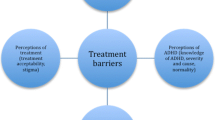Abstract
Limited information exists on views among African American families living in low-income, inner-city communities regarding the treatment of children with attention-deficit/hyperactivity disorder (ADHD). Parents of children treated for ADHD in an urban primary care setting were recruited to complete a survey to assess attitudes toward stimulant medications. Although most (71%) were initially hesitant to use stimulants based on what they heard in the lay press, 63% would recommend stimulant medication to a relative/friend whose child had ADHD. Approximately 17% believed stimulants led to drug abuse, 21% preferred counseling over medication, 21% felt medications had bad side effects, and 23% believed that too many children were medicated for ADHD. Most (90%) felt the medication was safe if a physician recommended it. Views did not differ between participants whose child had or had not received counseling. Additional studies are needed to clarify whether such views impact treatment choices and health outcomes.
Similar content being viewed by others
References
Centers for Disease Control and Prevention. Prevalence of diagnosis and medication treatment for attention-deficit/hyperactivity disorder-United States, 2003. MMWR Morbidity Mortality Weekly Report. 2005;54(34):842–847.
Zito JM, Safer DJ, dosReis S, et al. Psychotherapeutic medication patterns for youths with attention deficit/hyperactivity disorder. Archives of Pediatrics and Adolescent Medicine. 1999;153:1257–1263.
Zito JM, Safer DJ, dosReis S, et al. Racial disparity in psychotropic medications prescribed for youths with Medicaid insurance in Maryland. Journal of the American Academy of Child and Adolescent Psychiatry. 1998;37(2):179–184.
Olfson M, Gameroff MJ, Marcus SC, et al. National trends in the treatment of attention deficit hyperactivity disorder. American Journal of Psychiatry. 2003;160(6):1071–1077.
dosReis S, Zito JM, Safer DJ, et al. Mental health services for youths in foster care and disabled youths. American Journal of Public Health. 2001;91(7):1094–1099.
Zito JM, Safer DJ, Zuckerman IH, et al. Effect of Medicaid eligibility category on racial disparities in the use of psychotropic medications among youths. Psychiatric Services. 2005;56(2):157–163.
Kendall J, Hatton D. Racism as a source of health disparity in families with children with attention deficit hyperactivity disorder. Advances in Nursing Science. 2002;25(2):22–39.
Bussing R, Zima BT, Gary FA, et al. Social networks, caregiver strain, and utilization of mental health services among elementary school students at high risk for ADHD. Journal of the American Academy of Child and Adolescent Psychiatry. 2003;42(7):842–850.
Guevara JP, Feudtner C, Romer D, et al. Fragmented care for inner-city minority children with attention-deficit/hyperactivity disorder. Pediatrics. 2005;116(4):e512–e517.
McKay MM, Pennington J, Lynn CJ, et al. Understanding urban child mental health service use: two studies of child, family, and environmental correlates. Journal of Behavioral Health Services and Research. 2001;28(4):475–483.
Schnittker J. Misgivings of medicine?: African Americans’ skepticism of psychiatric medication. Journal of Health and Social Behavior. December 2003;44:506–524.
dosReis S, Zito JM, Safer DJ, et al. Parental perceptions and satisfaction with stimulant medication for attention-deficit/hyperactivity disorder. Journal of Developmental and Behavioral Pediatrics. 2003;24(3):155–162.
Bussing R, Gary FA, Mills TL, et al. Parental explanatory models of ADHD: gender and cultural variations. Social Psychiatry and Psychiatric Epidemiology. 2003;38:563–575.
Bussing R, Schoenberg NE, Perwien AR. Knowledge and information about ADHD: evidence of cultural differences among African-American and white parents. Social Science and Medicine. 1998;46(7):919–928.
Croghan TW, Tomlin M, Pescosolido BA, et al. American attitudes toward and willingness to use psychiatric medications. Journal of Nervous and Mental Disease. 2003;191(4):166–174.
McLeod JD, Pescosolido BA, Takeuchi DT, et al. Public attitudes toward the use of psychiatric medications for children. Journal of Health and Social Behavior. March 2004;45:53–67.
Rostain AL, Power TJ, Atkins MS. Assessing parents’ willingness to pursue treatment for children with attention-deficit hyperactivity disorder. Journal of the American Academy of Child & Adolescent Psychiatry. 1993;32(1):175–181.
Sax L, Kautz KJ. Who first suggests the diagnosis of attention-deficit/hyperactivity disorder? Annals of Family Medicine. September–October 2003;1(3):171–174.
Walter HJ, Gouze K, Lim KG. Teachers’ beliefs about mental health needs in inner city elementary schools. Journal of the American Academy of Child and Adolescent Psychiatry. January 2006;45(1):61–68.
Malacrida C. Medicalization, ambivalence and social control: mothers’ descriptions of educators and ADD/ADHD. Health (London). Jan 2004;8(1):61–80.
Boulware LE, Cooper LA, Ratner LE, et al. Race and trust in the health care system. Public Health Reports. 2003;118:358–365.
LaVeist TA, Nickerson KJ, Bowie JV. Attitudes about racism, medical mistrust, and satisfaction with care among African American and white cardiac patients. Medical Care Research and Review. 2000;57(Suppl 1):146–161.
Zarin DA, Tanielian TL, Suarez AP, et al. Treatment of attention-deficit hyperactivity disorder by different physician specialties. Psychiatric Services. 1998;49(2):171.
Gingerich KJ, Turnock P, Litfin JK, et al. Diversity and attention deficit hyperactivity disorder. Journal of Clinical Psychology. 1998;54(4):415–426.
Garland AF, Landsverk JA, Lau AS. Racial/ethnic disparities in mental health service use among children in foster care. Children and Youth Services Review. 2003;25(5/6):491–507.
Acknowledgments
The authors are indebted to the nurses and administrative personnel whose assistance made this work possible. The authors also gratefully acknowledge Dori Makowske for assistance with the survey administration and data entry.
Author information
Authors and Affiliations
Corresponding author
Additional information
This study was supported through a research grant from the National Institute of Mental Health (R03-MH58470; Dr. S. dosReis) and the Thomas Wilson Sanitarium for Children of Baltimore City (Dr. R. Chernoff).
Rights and permissions
About this article
Cite this article
dosReis, S., Butz, A., Lipkin, P.H. et al. Attitudes About Stimulant Medication for Attention-Deficit/Hyperactivity Disorder Among African American Families in an Inner City Community. J Behav Health Serv Res 33, 423–430 (2006). https://doi.org/10.1007/s11414-006-9038-y
Published:
Issue Date:
DOI: https://doi.org/10.1007/s11414-006-9038-y




